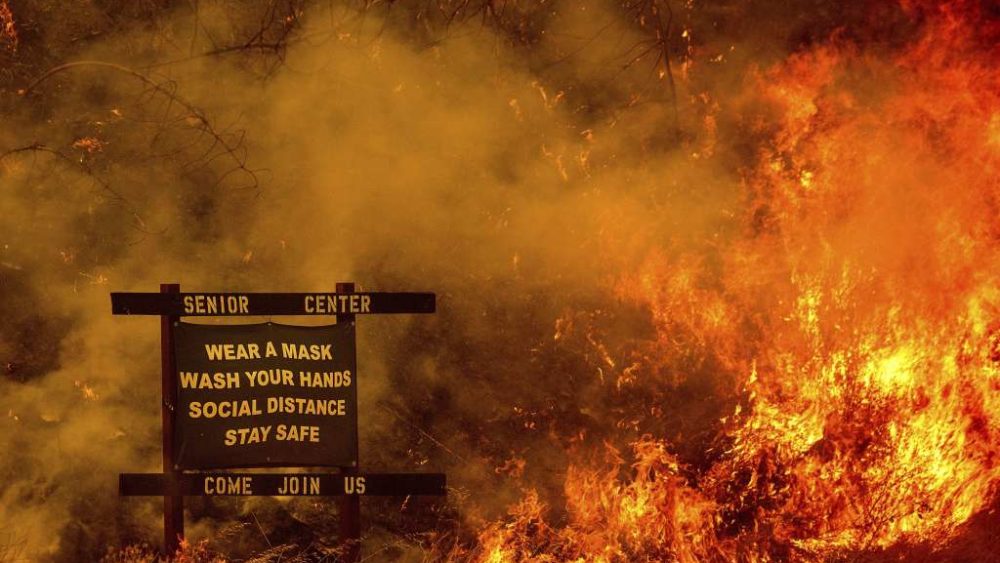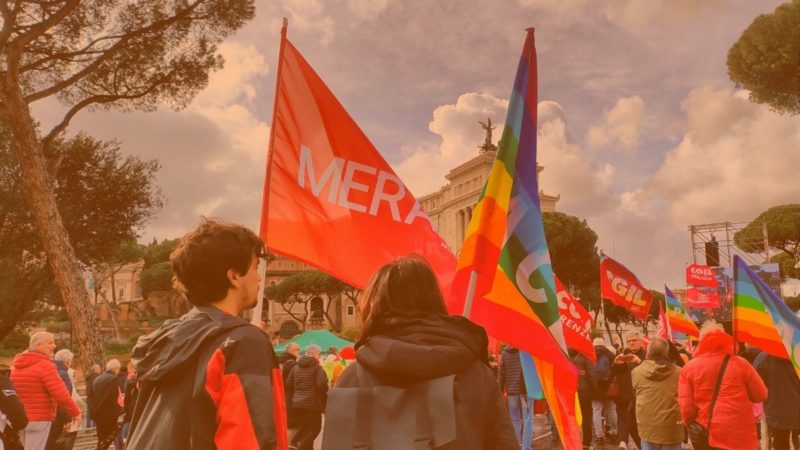As apocalyptic, orange-toned images of the horrific wildfires raging across the western United States flood our timelines and front pages, it’s impossible to ignore the fact that climate breakdown is not some distant crisis that future generations will have to solve, but rather its flames are lapping at our doorstep, right now
A similarly orange-toned Donald Trump seems intent on denying the link between these fires and climate breakdown, blaming Californian “forest management” for the inferno, and wilfully ignoring both a record-breaking heatwave this summer and the hottest reliably recorded temperature in human history (54.4C). This comes as no surprise though, because to acknowledge the climate crisis is to acknowledge reality, a concept that Trump and his acolytes seem allergic to. The fact that the US emitted over 6.6 billion tonnes of greenhouse gasses last year or that over 150 million trees in California died due to drought in the previous decade didn’t warrant a mention from the president.
To those paying attention and willing to listen to science and reason, climate heating records are broken every single year, and a nightmarish cascade of natural disasters seems to regularly unfold across the globe
It may seem like a distant memory to some, after such a turbulent year thus far, but it would be impossible to forget the nightmarish scenes from Australia earlier this year, which killed or displaced an estimated 3 billion animals and scorched over 46 million acres. As Greta Thunberg said, “Our house is on fire”, and it is spreading out of control.
The fiery historian of fire and the man-made Pyrocene, Stephen J. Pyne has shattered a number of illusions surrounding wildfires, and offers an eye-opening comparison to a certain pandemic that has also spread “like wildfire” across the world this year. Much like COVID-19, wildfires are a biological phenomena which can spread exponentially, and while “good fires” and “good government” can mitigate some of the most ruinous effects of wildfires, unfortunately we will never be able to create a vaccine for wildfires. As long as fires remain a problem for someone else, particularly for those of us in temperate Northern Europe, it will remain easy for those in power to ignore these risks entirely, failing to draw a meaningful connection between our own reliance on fossil fuels and a world that is literally burning as we speak.
In the UK, our government has failed to meet 17 out of 20 UN biodiversity targets, and 1 in 10 of our animal species are facing extinction. As temperatures soar to new heights every summer it is highly likely that wildfires of the kind we saw last year will become an increasingly common occurrence, which will decimate what precious little biodiversity remains in the UK. Elsewhere in Europe, a perfect storm of rising temperatures, droughts and high density forests leave much of Spain, Portugal and Greece susceptible to fires, as we saw tragically in the 2018 Attica fires that killed over 100 people.
So what can be done to stop the seemingly inexorable sleepwalk towards an ecological cliff edge?
How can the politics of disaster capitalism even hope to protect us from climate breakdown? It is clear that nationalist and authoritarian governments are woefully ill-equipped to deal with any kind of natural disaster, judging by the behaviour of Trump, Bolsonaro et al. At worst, these leaders outright deny the existence of climate change. But even in the more moderate outposts of liberal politics we have seen a culture of hand-wringing but ultimately inaction on the climate crisis.
The failure of many countries to meet the terms of the 2016 Paris Agreement has been widely condemned, but without a mechanism of enforcement, each country is individually responsible for its own efforts to meet the relatively lax targets set. As such, it falls on responsible citizens to take matters into their own hands and urge their governments to tackle the climate crisis with the force it requires right now, rather than setting pathetic “net-zero by 2050” targets. Unfortunately for most of us, the neoliberal stranglehold on electoral politics has robbed us of the chance to take swift action against climate breakdown, with other more distracting topics creeping up the agenda.
Much of the discourse around climate breakdown activism has fallen outside of the realm of electoral politics
The zeitgeist of post-Occupy political protest has been seized by Extinction Rebellion (XR), who place direct and symbolic action against the climate crisis at the forefront of their agenda and are in the process of being classified as an “organised crime group” by the government. But with the group determined to distance itself from socialist movements, it seems that at their core are essentially capitalists with bicycles. To truly become a social movement, green politics must be related to the interests of the majority, and must recognise that neoliberal capitalism as it currently exists is incompatible with meaningful climate activism. To quote Chico Mendes, “environmentalism without class struggle is just gardening.”
However, a rare cross-party ‘Climate and Ecological Emergency Bill’ was tabled in the UK recently which aims to expand the remit of the 2008 Climate Change Act, setting more ambitious targets for climate breakdown and would force the UK to take responsibility for its true carbon footprint. The bill would put into practice some of XR’s demands, including the creation of a citizens’ assembly, selected randomly from the population, who would recommend measures for dealing with the crisis. The bill also facilitates a ‘just transition’ to a greener economy by providing sectors with high emissions and an unsustainable environmental impact with the financial support and retraining necessary for their repurposing. While the bill commands widespread support amongst opposition MPs, it is unfortunately unlikely that the Conservative government will allow it to be passed.
The fight for a Green New Deal for Europe will likely continue to be one that is waged from the opposition benches and in the streets and town squares across most of Europe
Ultimately, we face a stark choice: We can choose to remain complacent, happy to watch wildfires scorch the planet, hurricanes and floods leave millions homeless and rising temperatures create droughts causing mass migrations wars for scarce resources. Alternatively, we can take action in our homes, reducing our carbon footprint on an individual level, and more importantly we can demand our governments commit to back the Green New Deal (for Europe) and take serious action against the 100 companies that produce 71% of all the planet’s greenhouse gas emissions.
For action to be taken against climate breakdown, it requires all of us to understand that we must completely transform our existing economic system
A solution to a problem on the scale of climate breakdown must be on the same scale as the problem itself, so we must abandon the politics of austerity: A ‘balanced budget’ will not protect us from wildfires, droughts or flooding, but a programme of Green Public Works will decarbonise the economies of Europe and guarantee secure and sustainable jobs for all those who seek them, driving down working hours and increasing workers wages. An Environmental Union will also bind EU member states to an equitable framework that will share both the gains and burdens of this ‘just transition’. Finally, the Green New Deal will establish an Environmental Justice Commission to centre social justice and ensure no community is left behind, and will also force the EU to combat resource exploitation and inequality around the world.
If we are serious about tackling climate breakdown, we must stop viewing these wildfires as a curious outlier and horrific spectacle, but instead centre them in the rapidly unfolding disaster that will be far more dangerous to humanity in the long run than any single pandemic. We stand at a dangerous crossroads, and the safer path could not be any more clear.
Photo Source: SFGATE.
The views and opinions expressed here are those of the author and do not necessarily reflect DiEM25’s official policies or positions.
Do you want to be informed of DiEM25's actions? Sign up here




